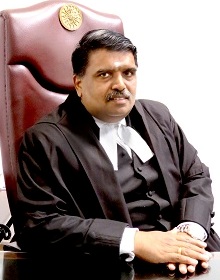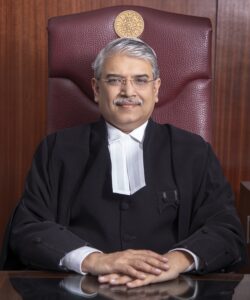Delhi High Court: The Division Bench of C. Hari Shankar and Subramonium Prasad, JJ., while addressing the matter expressed that:
Within the confines of the law, compassion must inhere in the approach of every court which practices equity.
Petitioner who had joined BSF in 1997 was detected with HIV+ in 2007.
Petitioner’s submission was that he was placed in the Low Medical Category due to which he was not given any promotion and at present, he was posted at the Headquarters, New Delhi since 2017.
Voluntary Retirement due to Transfer Order
He was aggrieved with the order of transfer at Cachar, Assam located on the Indo-Bangladesh Border as travelling to the said destination and discharging duties would be severely deleterious to his health and could also imperil his life, hence he applied for voluntary retirement.
“…rules applicable to the BSF permit BSF personnel to apply for voluntary retirement on 90 days’ notice.”
Petitioner had sought the retirement with effect from 30-09-2021 and also addressed a separate representation on 16th June seeking suspension of the transfer order.
Petition states that till date no decision on has been made on either of the above stated. Instead on 22-06-2021, a movement order was issued, relieving the petitioner of his duties at Delhi and directing him to report at Cachar, Assam on or before 5-07-2021.
In view of the above facts, the petitioner moved this Court.
Analysis, Law and Decision
High Court had queried as to whether the place to which the petitioner was being transferred, conformed to criteria A and B governing the places to which P-3 category personnel would be posted i.e. at which humidity level is less than 75 % round the year and which has access to specialist services nearby.
To the above-stated queries, the only submission of Mr Tiwari was that there happens to be a government hospital within 10 kms of the place to which the petitioner was posted. As to whether the said government hospital has the ART facilities to treat HIV+ patients, Mr Tiwari had no instructions, except to state that it’s a medical college.
Later, however, Mr Tiwari, respondent’s counsel did submit that the Government hospital had the facility to treat the HIV+ Patients, though he was still unaware of whether the required Mega Highly Active Retroviral Therapy facilities are available there.
Court was hoping that a compassionate approach would be adopted by the respondent, nevertheless, the respondents chose to contest the petition.
Bench stated that the MHA guidelines dated 28-09-2017 clearly require that P-3 category BSF personnel be posted at a place that has a humidity level of less than 75 % round the year and has access to specialist services nearby. To merely state that there is a medical college that has ART facility (which, too, is merely a telephonic instruction received during the course of hearing) at a distance of 10 km, in a place such as Assam, can hardly reflect compliance with the mandate of the guidelines.
Justice, it is well settled, has to be tempered with mercy and compassion. Justice to which mercy is alien is no justice at all.
In view of the facts and circumstances, Bench remarked that the petitioner did not insist upon staying in Delhi and very fairly, at the cost of his career agreed to voluntarily retire, hence the insistence of respondent on joining the duty at Cachar, in petitioner’s medical condition cannot be appreciated.
Therefore, petitioner was entitled to a stay of operation of the impugned order transferring him to Cachar as well as the movement order relieving him till the next date of hearing.
High Court noted that the writ petition was not accompanied with an application for stay and the power of the Court to pass appropriate orders, to aid the final order which can be passed by it, stood settled by Supreme Court as far back as in I.T.O. v. Mohd Kunhi, AIR 1969 SC 430.
Matter to be re-notified on 6-09-2021. [Kavendra Singh Siddhu v. Union of India, 2021 SCC OnLine Del 3602, decided on 2-07-2021]
Advocates before the Court:
For the Petitioner: Mr Aditya Hooda, Advocate
For the Respondents: Mr Jivesh Kumar Tiwari, Senior Panel Counsel with Mr Shoumendu Mukherji, GP for Union of India.
About the Bench:
Justice C. Harishankar

He was born in New Delhi on 4th May 1968, Justice C. Hari Shankar completed his schooling from St. Columba’s School and, thereafter, acquired B. Sc. (Hons) in Chemistry from Kirori Mal College and LL.B. from the Campus Law Centre, Delhi University in 1993. He has appeared, as arguing/senior counsel, before several judicial fora, including, but not limited to, the Supreme Court of India, High Courts of Delhi, Calcutta, Gujarat, Bombay, Allahabad, Punjab & Haryana, Madhya Pradesh, Rajasthan, Uttaranchal, Andhra Pradesh, Madras and Himachal Pradesh, the Central Administrative Tribunal, the Customs, Excise and Service Tax Appellate Tribunal, the Appellate Tribunal for Foreign Exchange, the Company Law Board, the AAIFR, the NCDRC, and the National Green Tribunal. His core areas of specialization were indirect taxes, along with allied subjects such as foreign exchange and COFEPOSA, and service law. He was on the Panel of Special Counsel representing the Central Government in the Supreme Court of India, and was also empaneled Counsel for the Directorate General of Anti-Dumping. He was regularly appearing on behalf of the Central Council for Research in Unani Medicine before the CAT and before this Court. On 20th August 2014, he was designated Senior Advocate by the Delhi High Court.
Justice Hari Shankar was appointed permanent Judge of this Court on 15th May 2017.
Justice Subramonium Prasad

Justice Subramonium Prasad graduated in B.Com. (Hons.) from Delhi University. He acquired his LLB degree from Campus Law Centre, Delhi University in the year 1990. Justice Prasad cleared the Advocate-On–Record exam in 1996 and started his independent practice. He became the Standing Counsel for the State of Tamil Nadu in the Supreme Court of India in 2003, a post he held till 2006. He was also the standing counsel for the custodian appointed under the Special Court (Trial of Offences Relating to Transactions in Securities) Act, 1992, dealing with cases pertaining to the 1992 stock exchange scam. In October 2012, Justice Prasad was appointed as the Additional Advocate General for the State of Tamil Nadu in the Supreme Court of India. Justice Prasad was designated as a Senior Advocate by the Supreme Court of India in April 2015.
Over his career spanning 28 years, Justice Prasad has worked on several high profile matters, and has been involved in several reported judgements of the Supreme Court on various subjects like Constitutional Law, Tax, Corporate and Commercial Law, Criminal Law, Election Law, Service Law and Inter State River Water Disputes.
Justice Prasad was appointed as an Additional Judge of the Madras High Court on 4.06.2018. He was transferred to Delhi High Court as an Additional Judge on 13.03.2020 and confirmed as a Permanent Judge of the Madras High Court on 17.03.2020.
[Source of information: Delhi High Court website]






